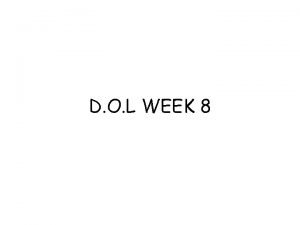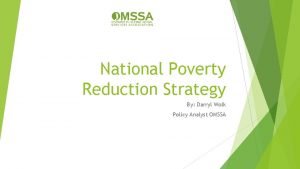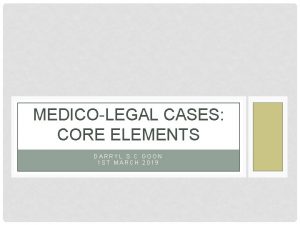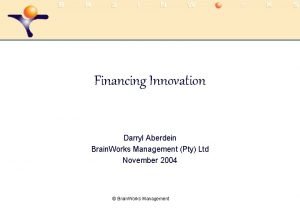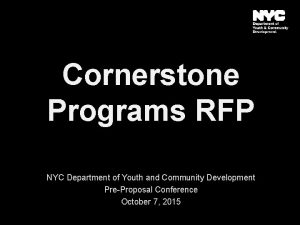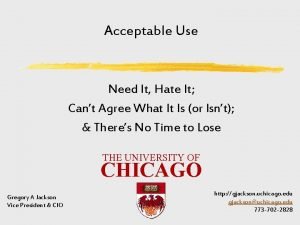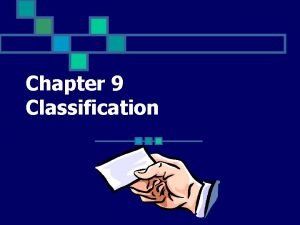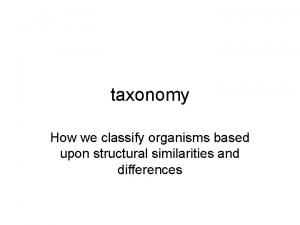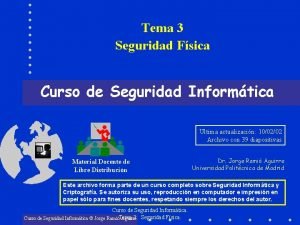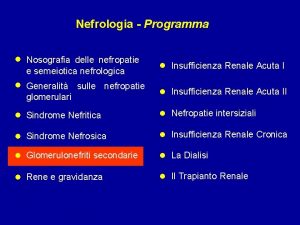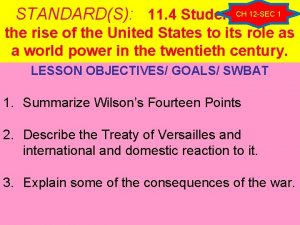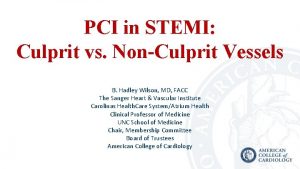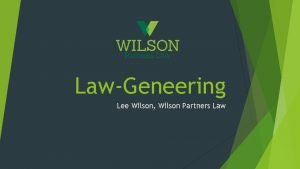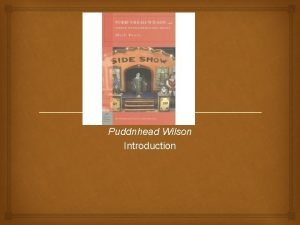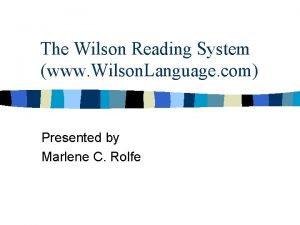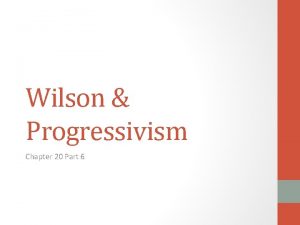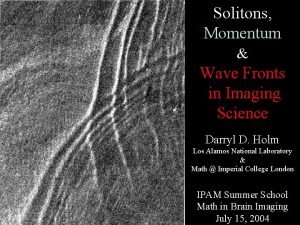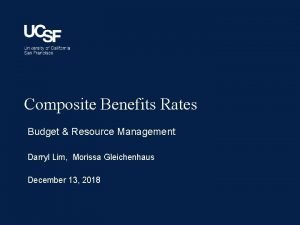MORTGAGES Prof Darryl C Wilson 2019 MORTGAGES Most











































- Slides: 43

MORTGAGES Prof. Darryl C. Wilson © 2019

MORTGAGES • Most people do not pay cash when buying real estate. Instead they usually employ one or more security devices. • Borrowing from a financial institution • Through a mortgage or trust device • Using seller financing • Through a mortgage or contract • Equitable mortgages or liens

MORTGAGES A mortgage is an interest in land created by a written instrument, providing security for the performance of a duty, or the payment of a debt. • When a buyer secures a loan from a financial institution they become a mortgagor (borrower) and the lender is the mortgagee (money). • The buyer executes a mortgage, document indicating the property is pledged as security for the loan, and a note, indicating the buyer is personally liable for the amount borrowed.

MORTGAGES • In some states Deeds of Trust are used instead of Mortgages. A deed of trust places legal title of the property in a trustee, often a financial institution officer, for the beneficiary, which is the lender. The borrower is the trustor who holds equitable title to the property. • Trustors are also known as settlors, grantors, or donors. • Deeds of Trust have 3 parties vs. Mortgages have 2 parties. • Trustors remain personally liable for repayment of the loan.

MORTGAGES • Mortgagors are generally the legal title holders, while the mortgage is a lien on the property. This is known as lien theory, as opposed to title theory, where the mortgagee holds legal title to the property until the loan is repaid. • In mortgage states judicial foreclosure is generally required. Judicial foreclosure is regulated by state statutes. • In deed of trust states, foreclosure may or may not be used. Deeds of trust are often used so that in case of borrower default, no judicial intervention is necessary. The lender instructs the trustee to foreclose by simply selling the property, based on a power of sale clause that’s part of the trust agreement.

MORTGAGES

MORTGAGES

MORTGAGES • When a prospective borrower can’t qualify for a mortgage or deed of trust, or does not want to use either, an installment land contract can be utilized as an alternative. • The purchaser (vendee) and seller (vendor) sign a contract agreeing that the vendee will make payments until the sales price is paid. The vendor retains legal title, and the vendee receives equitable title until full payment is made. • If the vendee defaults the contract usually provides for the summary forfeiture of all the vendee’s monies and interests in the property. However, many states require that foreclosure procedures be used to terminate installment land contracts.

MORTGAGES • Mortgagors are often notified of changes in the mortgagee. Mortgages are bought and sold like other securities. That takes place in what’s called the secondary mortgage market. • A mortgage generally IS NOT transferable without the note. • Valid transfer requires the mortgage and note be sold together to the same investor. When the mortgage is sold without the note courts may; • Find the sale null and void • Find the note deemed to automatically have transferred, despite the lack of physical exchange, thus giving the mortgage holder an equitable ground to demand physical transfer of the note

MORTGAGES • A note IS transferable without the mortgage either by Assignment or Indorsement; • Assignment does not require a separate writing and recording, but it is customary to do so. • Indorsement and delivery gives a bona fide transferee (taking in good faith without notice of any legal issues concerning the note) holder in due course status, if the note is negotiable meaning; • Its payable to bearer or to the order of a named payee • It contains a promise to pay a sum certain • It contains no other promises other than an acceleration clause and/or attorneys’ fee clause

MORTGAGES • Holders in Due Course take free of personal defenses such as; • • • Lack of consideration Fraud in inducement Waiver Estoppel Payment • But remain subject to real defenses such as; • • Minority status, duress, or other incapacity Fraud in execution Forgery or illegality Bankruptcy

MORTGAGES

MORTGAGES

MORTGAGES • Sometimes mortgagors send payoffs to mortgagees who have already transferred the note to a new mortgagee. If the note was nonnegotiable, the payment is effective against the new mortgagee until the mortgagor receives notice of the transfer.

MORTGAGES • Sometimes mortgagors transfer the property via deed to interested purchasers. If there’s nothing in the mortgage document that disallows the transfer the mortgagee cannot object. However, the purchaser takes the property subject to the existing mortgage. And the mortgagor remains personally liable for payment of the mortgage. The purchaser has no responsibility for the mortgage, but the property may be foreclosed on if the mortgagor defaults on payment. • Sometimes mortgagors transfer the property via deed to a purchaser who is interested in assumption of the existing mortgage. If the purchaser assumes the mortgage, the purchaser becomes primarily personally liable for the repayment of the loan. • If an assumption is allowed the original mortgagor becomes secondarily liable as a surety unless the mortgagee and purchaser modify the terms of the original mortgage, thus discharging the original mortgagor.

MORTGAGES • Due On Sale Clauses, and related provisions such as acceleration clauses allow mortgagees to demand full payment of all outstanding debt when mortgagors transfer any interest in the property without the mortgagee’s consent. These clauses are designed to; • Protect lenders from the sale of the property to a poor credit risk • Allow lenders to raise interest rates or charge an assumption fee • Federal law makes due on sale clauses enforceable for all types of mortgage lenders on all types of real estate, except isolated loans between private parties.

MORTGAGES • A mortgage is a contractual document, that is subject to standard contract challenges such as failure of consideration, duress, mistake, and fraud. • Federal laws like Dodd-Frank protect borrowers as well, prohibiting lenders from extending loans to those without the ability to pay, from steering them to bad loans, and from engaging in deceptive, abusive, and unfair practices. • Federal law also extends to mortgagors in default, requiring lenders to consider request to modify or cure in good faith when a request is made prior to foreclosure. If made after foreclosure, no sale can take place until the request is addressed. • The law of the state where the property is located governs mortgages, and specific choice of law clauses in those instruments are generally void.

MORTGAGES • Mortgages can be discharged in the following ways; • Payment • Full payment of the note discharges the debt. Payment can occur per the time set forth or possibly earlier. The note or mortgage must allow for prepayment for the latter right to exist, and there may be a fee or charge for prepayment. • Merger • If a mortgagee acquires the mortgagor’s interests in the subject property, the legal and equitable interest in the land merge and the mortgagor’s personal liability for the mortgage is discharged up to the value of the land. • Deed in lieu of foreclosure • A mortgagee may acquire the mortgagors interest by accepting a mortgagors deed in lieu of foreclosure. This transaction allows immediate repossession by the mortgagee and may result in full or partial discharge of the mortgage debt.

MORTGAGE DEFAULT • Pros • • Intercept rents Prevent waste Make repairs Lease vacant space • Cons • Strict duty to account for rents • Duty to manage in a careful and prudent manner • Potential liability to anyone injured on the property

MORTGAGE DEFAULT �To avoid MIP status a mortgagee may include a mortgage clause allowing for the appointment of a receiver. A receiver is an independent third party agent of the court who acts to protect disputed property. �Receivership clauses in federally insured mortgages are given substantial weight regardless of the circumstances. �The most common receivership rule requires; ● Insolvency of the mortgagor ● Inadequacy of the security ● Danger of loss, waste, destruction or serious impairment of the property �The Restatement is a bit more lenient requiring; ● A mortgagor in default ● Real estate value’s inadequate to satisfy the mortgage obligation ● The mortgagor is creating waste

MORTGAGE DEFAULT • All mortgagors may use their equity of redemption prior to foreclosure to cure their default. • Beforeclosure their mortgage may also give them a contractual right of reinstatement. • Mortgagors may also have statutory rights of redemption after foreclosure that may allow them to recover their property.

MORTGAGE DEFAULT • The equitable right of redemption is a debtor’s right to cure the default in the mortgage prior to foreclosure. • The equitable right of redemption should not be confused with; • The contractual right to reinstatement • The statutory right of redemption • The owner’s equity in the home

MORTGAGE DEFAULT • The “anti-clogging rule” provides that a mortgagor’s “equitable right of redemption” can’t be eliminated, circumvented, waived or otherwise imposed upon regardless of the documentation exchanged between the mortgagor and mortgagee. • The rule applies primarily at the inception of the instrument(s), but possibly collaterally, and prevents a mortgage instrument from being deprived of its essential characteristics.

FORECLOSURE

FORECLOSURE • Foreclosures differ depending on jurisdiction but generally occur in one of the following forms; • Strict foreclosure • No sale • Judicial foreclosure (mortgages, etc. ) • Decision and sale pursuant to statutory guidelines • Power of sale (deeds of trust, etc. ) • Sale w/o judicial intervention

FORECLOSURE • Judicial foreclosure is the predominant method as it is available in every jurisdiction. A judicial foreclosure results in the sale of the property. Judicial foreclosure may be; • Required by statute • Necessary b/c a mortgage fails to include a power of sale or the jurisdiction does not allow power of sale • Required b/c a serious lien priority dispute exist • Required b/c a mortgage substitute is in dispute • The purpose of foreclosure is to put the sale purchaser in the shoes of the mortgagor at the time the mortgage was executed. • Everyone who possibly has an interest in the mortgaged property should be joined in the proceedings.

FORECLOSURE ● Mortgagors may have more than one mortgage on a property. They may use equity based on the property value to secure a loan for other uses. Mortgages are prioritized in the order that they are taken, as opposed to the amount of the loan. ○ i. e. , B buys Baracre from O for $100 K at FMV. B borrows $90 K from L 1 to help fund the purchase and pays on the loan for five years. The economy heats up and B gets big raises and the property value also increases to $150 K. B has been doubling up principal payments so now only owes $75 K. B now has $75 K of home equity and decides to give a mortgage to L 2 to get funds to buy a $60 K boat. L 1 is the senior mortgagee and L 2 is the junior mortgagee. ● Foreclosure generally destroys all interests junior to the mortgage being foreclosed. This includes junior mortgages, liens, encumbrances, and other interests claimed against the property.

FORECLOSURE ● Proper foreclosure requires that a mortgagee give notice to all subordinate parties. Any interest holder junior to the foreclosing mortgagee is considered a necessary and proper party. Failure to notify a necessary party results in the preservation of that party’s interest despite foreclosure and sale. Notice is not required to be given to holders of interest senior to that being foreclosed, however it is good practice to do so. Foreclosure of a junior mortgage will not affect the interest of a senior mortgage. ○ i. e. , B defaults on the $60 K loan and L 2 decides to foreclose. L 2 does not have to notify L 1 and L 2’s foreclosure does not affect L 1. If U buys Baracre at the foreclosure sale U takes it subject to L 1’s mortgage. B is still liable for payments on L 1. ● A purchaser of a junior foreclosed interests takes subject to any senior interests. The purchaser may redeem the senior interest if they want to avoid losing the property should the mortgagor default on its obligation to the senior interest holder.

FORECLOSURE ● Mortgagee priority is initially set by chronological order but may be modified in certain situations such as; ○ failure to record in accordance with the governing recording statute ○ the execution of a subordination agreement between mortgagees ○ modification of a senior mortgage that impairs the value of the junior mortgage ○ existence of a further advances clause, prior to the placement of a junior mortgage ○ subrogation of one lender for another based on refinancing ● ● Priority can also be affected by the existence of a purchase money mortgage There are technically two types of purchase money mortgages ○ 3 rd party lender PMMs ○ Vendor PMMs

FORECLOSURE ● 3 rd party lender purchase money mortgages are basically standard mortgages, meaning loans from financial institutions for funds to purchase property. Lenders will take mortgages for funds used to pay for non property purposes. PMMs have presumptive priority over those types of loans, but subject to recording acts and timing issues. ● Vendor purchase money mortgages generally have priority over all other types of interests, regardless of recording acts or notice of other interests. A vendor PMM occurs when the seller acts as the financial institution. Sellers who hold the paper on loans are held to the same regulatory standards and fiduciary duties as normal mortgagees. ● 3 rd party lender PMM conflicts are resolved by chronology

FORECLOSURE • If a sr. forecloses w/o joining a jr. lessee the jr. ’s interest is normally unaffected. • A sale purchaser of a sr. mortgage has the right to pay off jr. interest if that purchaser desires. • A sale purchaser who takes without notice of jr. interest will take free and clear of any equitable interests in the property or any legal interests that were not recorded. • The sale purchaser may still be affected if a foreclosed party is able to use any statutory right of redemption.

FORECLOSURE • Judicial foreclosure will not terminate unjoined junior interests. Junior lien holders may foreclose w/o joining senior lien holders since their rights may not be dependent on the senior mortgage. • A junior may join a senior for strategic or informational purposes but courts will not force a senior to be part of a junior foreclosure proceeding. • If a lease is senior to a foreclosed mortgage the purchaser takes the mortgagor’s interest and becomes the lessee’s landlord but if the lease is junior the leasehold interest is terminated. • A mortgagor can have as many mortgages on property as lender’s are willing to allow.

FORECLOSURE • Marshaling is an equitable doctrine used to dictate the order in which mtgees must foreclose when the mortgage covers more than one property. • The “two funds rule” (or 2 pieces of collateral test) is a marshaling principle used to preserve the interest of a jr. party in a second property. • In applying the rule a jr. party can request that the sr. property be looked to first to satisfy the debt and if selling that property will suffice the interest of the jr. party will be maintained in the other property. • i. e. B buys Baracre and Scaracre using a $90 K mortgage from LI. B later uses equity in Scaracre for another mortgage of $60 K from L 2. B then defaults on LI. L 2 can request that Baracre be looked to first to satisfy the outstanding loan.

FORECLOSURE • Another form of marshaling is found in the application of the “inverse order of alienation rule”. This rule applies when the owner of property has sold part of the property. • For example an owner secures a blanket mortgage on 3 lots then sells lot 1 to A and lot 2 to B while keeping lot 3. A and B do not assume the mortgage and pay full value for their lots. The owner defaults on the loan and foreclosure is instituted. Owners A and B can insist that lot 3 be looked to first to satisfy the debt. If that is not sufficient A can insist that lot 2 be looked at next. And so on….

FORECLOSURE • Approximately half the states have a statutory right of redemption that comes into play once the equitable right of redemption is terminated by foreclosure. FL is not one of them. The time periods range from a few months to more than a year. • Where statutory redemption is allowed and a number of jr. interests attach to a property the manner in which one or more parties seeks to redeems is governed by the strict priority approach or by the scramble method.

FORECLOSURE ¡If a sale occurs and the amount bid is not enough to cover the debt a deficiency exist for which the mortgagor is liable. ¡If the sale amount is more than the debt owed the surplus may be used to pay junior liens and possibly, the mortgagor. Sale proceeds are paid (provided funds are available) in order of; ● expenses of the sale ● court costs and attorneys fees ● principal and interests on the foreclosed loan ● junior liens

MORTGAGE SUBSTITUTES • When standard financing is not available due to risk (borrower credit history, nature of the transaction, etc. ) lenders may offer financing through unconventional means. • Lenders generally extend credit if they can have security (property) for their loan with the least potential impediment from the debtor should a default in payment occur. • Thus they may offer terms other than a standard mortgage and note arrangement. • If they do not offer alternatives, sellers may present some other more personal options.

MORTGAGE SUBSTITUTES • Lenders often offer alternatives to circumvent statutory foreclosure rights (i. e. equity of redemption) and rules constructed to protect the debtor property owner. • Lenders see five major benefits in such an approach; • 1. avoidance of legal costs in terms of dollars and delay • 2. potential for expedited possession of the premises • 3. right to personal property associated with premises • 4. prevention of debtor from further encumbering the property • 5. potential for enlarging security interest to cover future loans • Lenders seeking to avoid statutory foreclosure rules may run afoul of important federal laws and equitable principles.

MORTGAGE SUBSTITUTES • Clogging situations often occur when creditors use deeds and contracts as disguised mortgages. • A creditor may require a debtor to execute a deed to the land being used as security for the loan with a reconveyance to occur upon full repayment. This is known as an “absolute deed” situation. • An absolute deed situation is characterized as a “conditional sale” when the debtor executes documents in addition to the deed as part of the transaction.

MORTGAGE SUBSTITUTES • Absolute Deeds, a/k/a Equitable Mortgages are characterized by; • Existence of a debt or promise of payment by the deed’s grantor • The grantee’s promise to return the land if the debt is paid • The amount of the advanced payment is much lower than the property’s value • The existence of grantor financial distress • Evidence of the parties prior negotiations. • If these elements are present, based on clear and convincing evidence, a court will require that termination of the arrangement occur by adherence to the judicial foreclosure rules.

MORTGAGE SUBSTITUTES ¡Documents typically executed conditional sales (disguised mortgage) arrangements include; ▪Written option contracts to repurchase ▪Unconditional contracts obligating the grantor to repurchase ▪Lease-back contracts with an option to repurchase and rent pmts equal to mtg pmts ¡To determine if parties meant to create an actual transfer of ownership or instead develop a mortgage relationship one looks to; ▪The intent of the parties as reflected by the facts The circumstances to see if they justify a mortgage arrangement despite the parties intent

MORTGAGE SUBSTITUTES ¡Installment land sales contracts are the most common mortgage substitute. They require that payment be made according to certain terms over an extended period of time prior to the vendee receiving a deed to the subject property. ¡Installment land sales contracts (ISLK) are also called agreement for deed in some places such as Florida. ISLK’s are generally characterized by two closings. One at the time of the initial contract and exchange of consideration and another when the full amount has been paid and a deed to the property is exchanged.

MORTGAGE SUBSTITUTES • If the installment contract is characterized as a mortgage then the foreclosure process must be followed and contract remedies are unavailable. • If forfeiture is allowed the vendor is usually barred from seeking the equivalent of a deficiency judgment. • A vendor has a choice of remedies if the statutory law doesn’t dictate a particular path. However the doctrine of election of remedies is applied to prevent double recovery. • A choice of specific performance is deemed a confirmation (versus repudiation) of the contract.
 Montana board of housing
Montana board of housing Prof w c wilson
Prof w c wilson Darryl
Darryl Darryl wolk
Darryl wolk Darryl goon
Darryl goon Darryl
Darryl Darryl haddock
Darryl haddock Have you forgotten youtube
Have you forgotten youtube Darryl
Darryl Darryl veld
Darryl veld Dycd rfp
Dycd rfp Darryl perlin santa barbara
Darryl perlin santa barbara Darryl linnington
Darryl linnington Most general to most specific classification
Most general to most specific classification In the name of allah, the beneficent, the merciful
In the name of allah, the beneficent, the merciful The most
The most In the name of allah most beneficent most merciful
In the name of allah most beneficent most merciful Most general to most specific classification
Most general to most specific classification In the name of god most gracious most merciful
In the name of god most gracious most merciful In the name of allah the most beneficent the most merciful
In the name of allah the most beneficent the most merciful In the name of god most gracious prayer
In the name of god most gracious prayer In the name of allah the most gracious the most merciful
In the name of allah the most gracious the most merciful In the name of allah the most beneficent the most merciful
In the name of allah the most beneficent the most merciful Most general to most specific classification
Most general to most specific classification In the name of allah the most gracious
In the name of allah the most gracious Allah the most gracious
Allah the most gracious In the name of god the most gracious the most merciful
In the name of god the most gracious the most merciful Organisms taxonomy
Organisms taxonomy August wilson
August wilson Wax pattern
Wax pattern 200 mya
200 mya Que es una politica administrativa
Que es una politica administrativa Jose wilson zangirolami
Jose wilson zangirolami Simon wilson partner
Simon wilson partner Naughton & wilson
Naughton & wilson Glomerulosclerosi di kimmelstiel-wilson
Glomerulosclerosi di kimmelstiel-wilson Kristen wilson injuries
Kristen wilson injuries Treaty of versailles terms
Treaty of versailles terms Dodero company produces a single product
Dodero company produces a single product Wilson six one 95 332g
Wilson six one 95 332g Chapter 19 the americans
Chapter 19 the americans Why did the allies reject wilson's peace plan
Why did the allies reject wilson's peace plan Hadley wilson md
Hadley wilson md Colin henry wilson
Colin henry wilson

